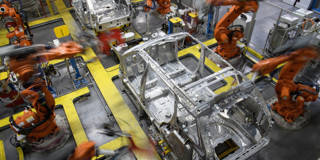The public reaction to recent proposals that robots be taxed when they replace human labor has been largely negative. But a moderate tax on robots – even a temporary levy that merely slows the adoption of disruptive technology – seems like a natural and obvious component of any policy to address rising inequality.
NEW HAVEN – The idea of a tax on robots was raised last May in a draft report to the European Parliament prepared by MEP Mady Delvaux from the Committee on Legal Affairs. Emphasizing how robots could boost inequality, the report proposed that there might be a “need to introduce corporate reporting requirements on the extent and proportion of the contribution of robotics and AI to the economic results of a company for the purpose of taxation and social security contributions.”

NEW HAVEN – The idea of a tax on robots was raised last May in a draft report to the European Parliament prepared by MEP Mady Delvaux from the Committee on Legal Affairs. Emphasizing how robots could boost inequality, the report proposed that there might be a “need to introduce corporate reporting requirements on the extent and proportion of the contribution of robotics and AI to the economic results of a company for the purpose of taxation and social security contributions.”